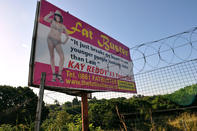Modern food systems and the layout of the city are making it harder for us to make good food and lifestyle choices and easier for us to make bad ones. There are many reasons why we love food as much as we do – be they rooted in evolutionary programming, culture or rare faulty genetics.

Whichever way, we are getting heavier than we have ever been and it is killing us. The global obesity pandemic is threatening to reverse the modern gains in life expectancy. Diseases related to being overweight are becoming a greater danger to southern Africans than the communicable diseases such as TB and HIV.
Vital statistics like these are not unusual in this part of the subcontinent. The World Bank estimates that more than half of all South Africans 15 years or older (55%) are either overweight or obese.
While the modern zeitgeist is not terribly forgiving of those extra kilograms (the United States has become something of a mockery with its call for larger airline seats and modified hospital equipment to deal with passengers’ and patients’ increasing sizes), the fact is, it is part of a trend that started in the ‘West’ in the 1970s and is now sweeping the globe.
With greater wealth comes greater weight. It is pretty simple, writes Dr Boyd Swinburn from the World Health Organisation’s (WHO) Collaborating Centre for Obesity Prevention: once a country’s Gross Domestic Product (GDP) goes up, its population becomes older, more urban, more mechanised and motorised, and its palate abandons traditional fare for highly processed, energy-dense foods.
But while it is true that money enables obesity, it does not mean you have to be rich to get fat, because so much of modern, urban life makes it easy to buy high-energy, fantastic tasting, largely ‘empty’ and cheap calories – and certainly more calories than we are necessarily going to burn in a day.
By Leonie Joubert